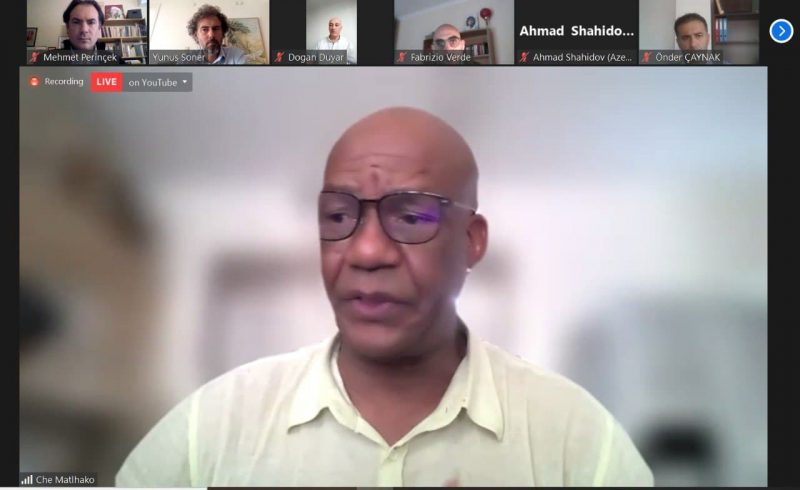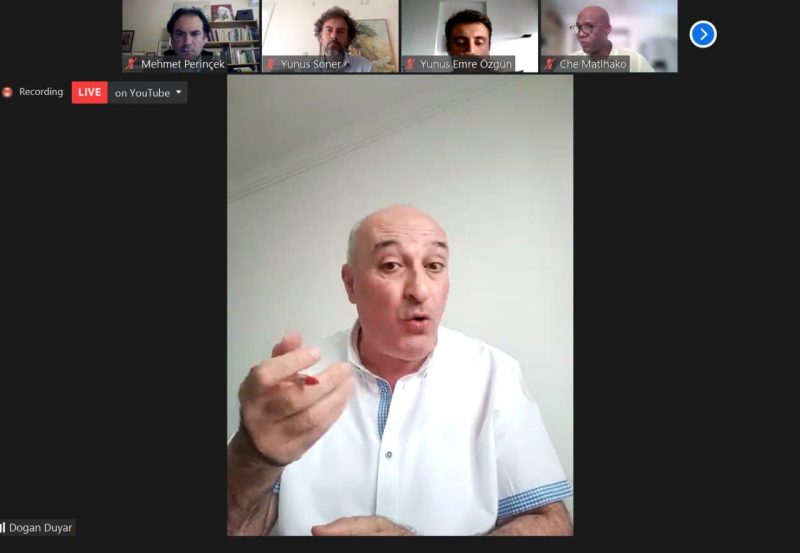“After achieving independence, African countries pursued a de-colonization tied to the former metropole, resulting in lack of economic independence and industrialization. But today, multilateralism opens new possibilities to establish a true and own, African trajectory of development”, said Chris Matlhako, Deputy Secretary General of the South African Communist Party.
“African development runs in cycles of approximately 60 years. The continent fought 60 years for political independence from colonial powers, achieved in the 1960s. Then followed another wave, which also lasted 60 years, where former colonial powers and new ones, France and the US have established a neo-colonial dominance over the continent. Today, the third wave has begun, where emerging powers such as China, Russia and Turkey support a new trend of independence on the continent”, said Doğan Duyar, Algeria-based expert on North Africa.
Both spoke on the webinar, which United World International has organized on October 15, under the title of “Africa and Multilateralism”, with participation of journalists and experts from various countries.
UWI expert Yunus Soner opened the webinar with brief remarks. Soner stated that the global decline of US hegemony is mirrored on the African continent by the factual establishment of multipolarity. The emergence of new powers on the continent, such as China, Russia and Turkey, provides African countries new opportunities and new solutions for problems on the continent that exclude the former colonial powers, he added.

Post-independence tied to the metropole
Chris Matlhako emphasized that the continent’s post-independence process has lacked an own trajectory of development, because it was tied to the former colonial power. For instance, West African countries have not introduced national currencies and central banks, instead being dependent on France. Meanwhile, the US as a new power on the continent established various military bases, imposing its economic policies and becoming a major source of hard currency income, he stated.
He provided the example of Sudan divided by US intervention, of Zimbabwe, where the United Kingdom imposed sanctions and embargoes to stop a land reform and Mozambique, where France is intervening militarily to protect interests of its oil companies. Central Africa meanwhile was left to France for policing, Matlhako stated.
This metropole-dominated process impeded Africa from integration in political terms, where for instance France tries to undermine the African Union, and slowed down the continent’s cultural integration. Matlhako mentioned the lack of an African-owned satellite and the fact that France24 or BBC Africa are still the major news outlets on the continent, while one has to fly via Paris to get from Johannesburg to Algeria.
“Africa will be the new global center”
Algerian-based expert Doğan Duyar confirmed that the past years belonged to neo-colonial domination, but emphasized the future weight of Africa globally. He said that with its rising population, expected to be with 4.8 billion 40% of the earth’s population in 2100, its needs and its resources that await exploitation, Africa constitutes the future heavy weight in global politics and economics, he said. Duyar stated a “great awakening in the African continent comparable to the explosion of a volcano”.
At this point, Matlhako warned that in the past, Africa has not been able to use its own natural and mineral base for development, because the value to these resources was added elsewhere. He warned that continuing the current economic model, several African countries might not be able to pay their debt to international organizations with the next 5 to 10 years.
China in Africa
But both experts agreed on that multipolarity and the increasing activities of China could support Africa’s industrialization.

Chris Matlhako from the Communist Party of South Africa stated that, although some Chinese projects like constructing presidential palaces are “not so positive”, the majority of Chinese infrastructure activities is “key to industrialization”, such as construction of ports and transport lines.
Moreover, he added, has the China-Africa Forum become “a very important platform”, providing possibilities to learn from China in fields such as building cities and fighting poverty. Matlhako emphasized, “China offers a successful example of socialist development and construction”.
Duyar confirmed that since 2013, China provides African countries within the Belt and Road Initiative increased economical alternatives and independency from former colonial powers. But, he added, security matters stand especially in the Sahel Zone in the foreground, where the states have the weakest military force in terms of international comparison. Duyar stated that for instance Chinese, but also Russian and Turkish security contribution to the Sahel Zone in terms of fighting terrorism is crucial to further advance economic development.
Multilateralism, BRICS and G-77
Fighting terror is key to sovereignty, the respect to which according to Matlhako will be at the center of multilateralism. According to him, a key player for multilateralism will be BRICS, the G-77 Movement and the Non-Aligned-Movement. A new development bank can substitute the IMF, said Matlhako, while warning that countries such as France will try to undermine according initiatives.
Turkey-Africa relations
The webinar discussed in two chapters also Turkish activities in Africa. Stating that the Turkish-African Summit provides “new dimensions to Africa”, Matlhako underlined that for instance Turkish Airlines is the airline flying to most African cities, surpassing others such as Air France or British Airways. He also stated that Turkey has a strong manufacturing sector, from which African countries can benefit. “On the political front, Turkey has a role to mitigate American hegemony”, stated Matlhako from the South African Communist Party.
Duyar stated that since 2013, African countries are living their second war of Liberation against former colonial powers such as France and neocolonial hegemonies such as the US. He emphasized that Turkey, which has started the 20th century with its own War of Liberation, stands by the side of African countries in that conflict.
Turkey and Russia in Libya
Turkey’s role was more specifically discussed in the context of Libya, where Soner opened the discussion by reminding that a US-led NATO intervention to topple down Muammar Ghaddafi had led the country into a civil war.
Matlhako emphasized the importance of Turkish-Russian relations, just as in Syria and noted that the US and NATO had “weaponized international relations”.
Duyar said that Libya was targeted by the West with the so-called Arab Spring, but the Turkish intervention had stopped that imperialist plans, contributing also positively to the situation in Mali and Algeria. He stated that the cooperation of China, Russia and Turkey among themselves and the local political forces is the key factor to protect the sovereignty and unity of the countries.
UWI expert Mehmet Perinçek also contributed to the discussion. “Militarily, Turkey and Russia could act as security guarantors in Libya by establishing security zones for which they are responsible. I’m not talking about zones of influence or dividing country. Unity of Libya is the most important point. This is the main goal. I’m talking about preventing a new conflict. To stabilize the status quo and start reality, not an ephemeral unification of power centers in the West and East, taking into account the interests of all its political forces, confessional, ethnic and tribal groups, taking into account Libya’s neighbors”, he said.
Perinçek added, “Libya could become a place where, as a result of agreements between Turkey and Russia, the access of destructive Western forces would be closed. The US and France are now seeking to push Turkey and Russia out of Libya. However, Turkey and Russia themselves could push the imperialist powers out of Libya if they could agree on the security of different parts of the country.”
The webinar concluded after questions and answers with a general consensus that multilateralism and multipolarity provides African countries with a path for their own trajectory of development.

















Leave a Reply